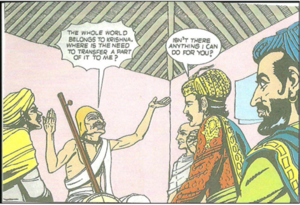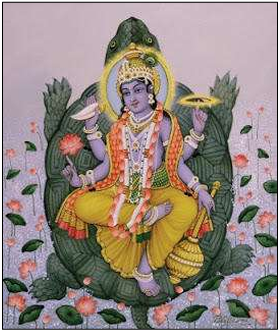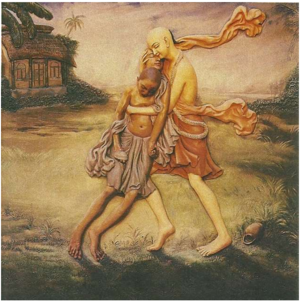Talk:Strength and Physical Ability
By Vishal Agarwal
One does not have to be healthy, strong, or physically fit to walk the path of Bhakti.
Story–Sūrdās, the blind Saint (1478–1573 CE)
Sant Sūrdās was born blind. Since his childhood, he was very interested in following groups of wandering musicians who sang the praises of Devī-s and Devatā-s. One day, he decided to follow a wandering party and left his home. He sang beautiful songs to Bhagavān and fed himself with donations given by kind devotees. A rich man was one day so impressed with his bhajan-s that he had a hut constructed for the blind musician and requested Sūrdās to live in it.
Sant Vallabhācārya, a great bhakta of Kṛṣṇa, one day heard about Sūrdās. He thought, How wonderful it would be if Sūrdās were to sing the praises of Kṛṣṇa? He approached Sūrdās and taught him about the life of Kṛṣṇa from the śāstra called Śrīmad Bhāgavatam. Sūrdās acknowledged him as his guru and, thereafter, decided to devote his life to singing the praises of Kṛṣṇa.
Sūrdās composed a new devotional song on Kṛṣṇa every morning and then sang it at the Śrīnath-jī Maṇḍir in Mathurā. His beautiful lyrics and songs became popular very fast, and he became a living legend. Once, Tānsen, the greatest singer of those times, sang one of Sūrdās’ songs in the royal court of Emperor Akbar, who ruled much of India from 1556 to 1605 CE.
The Emperor was greatly charmed by the song and sent a messenger with a request to Sūrdās that he should come and sing his bhajan-s on Kṛṣṇa at the royal court. But the sant responded that he sings only in and around the sacred region of Vraja (where Kṛṣṇa spent his childhood) and will not sing in any royal court. Akbar then went personally to Sūrdās’ hut and requested him to sing a new bhajan for him. Pleased with the song, Akbar offered Sūrdās a few villages as his personal property if he were to sing at the royal court, saying that the entire world belongs to Kṛṣṇa, and therefore, he did not want to say that the court of Kṛṣṇa in the maṇḍir was greater than all royal courts. But Sūrdās declined the gift or any part of it. Akbar was impressed by the bhakti of the sant and offered to give him any gift he asked for. To his surprise, Sūrdās merely requested, Emperor, please do not ask me again to come to the royal court. Akbar realized that Sūrdās was a great saint, and therefore he left respectfully.
Story – Kūrmadāsa: the Physically Challenged Bhakta of Bhagavān
In the thirteenth century, in the city of Paithan, on the river Godāvarī, lived a brāhmaṇa named Kūrmadāsa. Unfortunately, he was born with a great physical handicap — he had no hands and feet. His arms and legs ended in just rounded stubs. Due to this, he could not walk or do things that normal humans do with their hands. He lived entirely on the mercy of others. People called him Kūrma, which means tortoise.
One day, he heard some bhakta-s sing bhajan-s for Bhagavān Viṭhobā on their way to Paṇḍharpura to visit His shrine. Viṭhobā is a form of Viṣṇu, and a famous temple is dedicated to Him in Paṇḍharpura. Kūrmadāsa was greatly moved by the bhajan-s, and in his heart arose love for Bhagavān Viṣṇu. He begged the bhakta-s to take him to Paṇḍharpura along with them. But they refused, saying, Paṇḍharpura is a long way from here. You cannot walk and will slow us down.
Kūrmadāsa was disappointed. He decided to drag his body from Paithan to Paṇḍharpura till he had a darśana of Bhagavān Viṭhobā. But on the first day, he could drag himself only 2 miles. That night, he took shelter in a maṇḍir on the way and prayed to Viṭhobā, Bhagavān, I know that I will take months to visit your maṇḍir. I do not have hands, and therefore, I cannot carry any food or water with me. I do not have any feet, and so I can only reach your maṇḍir after many months. But I have faith in you. I place myself in your hands. Please make sure that I reach your maṇḍir for your darśana, and do not give up on my way.
A few minutes later, a rich merchant appeared in front of Kūrmadāsa. He said, I heard that you are on your way to Paṇḍharpura. I am also going that way. Why don't we cover the journey together? My name is Viṭhobā. Kūrmadāsa was surprised and said, But I can travel only two miles every day. You can reach there much sooner if you do not travel with me. Moreover, I am dependent on others to give me food and water.
The merchant smiled and said, Do not worry. I have to stop every 2 miles on my way to sell my goods, meet other merchants, and collect payments for goods sold. I needed a friend to reach my destination, and you would be a perfect companion. So, day after day, the merchant patiently covered a short distance of 2 miles with Kūrmadāsa. He took care to feed Kūrmadāsa lovingly and made sure that they both had a place to spend the night at the end of every day.
Four months passed this way. It was the month of Kārttika and the day of Ekādaśī when a grand gathering of Viṭhobā’s devotees took place at Paṇḍharpura. But, Kūrmadāsa and his merchant friend had reached only a place called Lāhul, which was 14 miles from Paṇḍharpura. Now, Kūrmadāsa despaired, and he cried out to Bhagavān, Master, it will take me a week to reach Paṇḍharpura, but your festival is today, I hope you will take pity on your bhakta and fulfill my desire here in Lāhul. The merchant Viṭhobā took leave of Kūrmadāsa to proceed to Paṇḍharpura. Kūrmadāsa asked some other bhakta-s on the way to Paṇḍharpura to pass on the message to Bhagavān at the maṇḍir that His bhakta was still 14 miles away from Him but wished to see Him.
Meanwhile, the great sant-s Jñāneśvara and Nāmadeva had joined other bhakta-s in Paṇḍharpura for the festival. Suddenly, Bhagavān Viṭhobā appeared in front of the two sant-s and said, My dear bhakta Kūrmadāsa waits for me in Lāhul, and I cannot let him down. Come, let the three of us walk to meet him! The sant-s followed Bhagavān, and on their way, they met another sant named Samvata, a gardener. The four of them then reached Kūrmadāsa in Lāhul.
When Bhagavān Viṭhobā appeared in front of Kūrmadāsa with the three sant-s, Kūrmadāsa wept with joy. Bhagavān said to Kūrmadāsa, I was the merchant who took care of you these last four months. I am very pleased with your bhakti. I will offer you a boon.
Kūrmadāsa could have asked Bhagavān Viṣṇu Viṭhobā to give him a perfect body. Instead, he prayed, You have appeared in front of your humble bhakta. What more could I have asked for? I only ask that you bless me and that you should always stay here in Lāhul so that disabled people like me who cannot travel to Paṇḍharpura can have your darśana here itself. Bhagavān Viṭhobā smiled and converted Himself into a mūrti there itself. A maṇḍir was constructed at Lāhul around the mūrti. Even today, on their way to Paṇḍharpura, the bhakta-s always stop at Lāhul to worship the gracious Bhagavān of Kūrmadāsa.
Story – Sant Śaṅkaradeva and the Leper
Tulsirāma, a distant relative of Sant Śaṅkaradeva, was afflicted with leprosy. Many forms of the disease are contagious, and there was no cure for it in those days. Lepers were shunned by everyone and kept away from the villages. No one wanted Tulsirāma close to them. Śaṅkaradeva took pity on Tulsirāma. He got a house constructed for Tulsirāma at a convenient location where he could get water easily. Śaṅkaradeva asked Tulsirāma to plant 100 tulasī (Ocimum sanctum) bushes around his house (because tulasī can cure leprosy) and pray to Kṛṣṇa day and night. He also made sure that Tulsirāma got a steady and constant supply of food from charitable passersby. Over time, Tulsirāma was cured of his disease and was completely healed. He became a disciple of Śaṅkaradeva.
Śrī Caitanya Mahāprabhu, too, once embraced a leper and healed him. One of his main disciples, Śrī Rūpa Gosvāmī, suffered from eczema, due to which he would scratch himself a lot, causing sores on his skin. Whenever Caitanya Mahāprabhu visited his student, he would embrace his disciple lovingly. Śrī Rūpa Gosvāmī once protested and said, Guru, please do not embrace me. As you know, I have sores on my skin, and I do not want you to become dirty. Caitanya Mahāprabhu replied, How can you be dirty or impure when you have dedicated your ātman, your mind, and your body to Bhagavān, who purifies everything and everyone?



